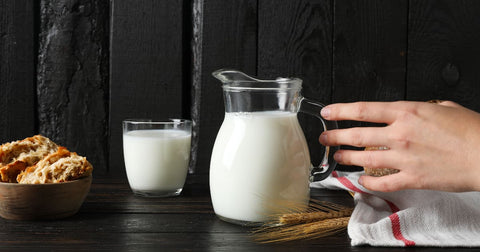Buttermilk, often associated with pancakes and Southern cooking, might not be the first drink you think of when it comes to health. But this tangy, fermented dairy beverage might just surprise you with its potential benefits. Let's explore whether buttermilk deserves a spot in your fridge and how it can contribute to your overall well-being.

Can You Drink Buttermilk?
Absolutely! Buttermilk is a perfectly safe and refreshing drink for most people. Its unique flavor and texture might take some getting used to if you're new to it, but its nutritional value makes it a worthwhile addition to your diet. However, if you have lactose intolerance or dairy allergies, be cautious and consider alternatives.
Is Buttermilk a Probiotic? The Gut-Friendly Factor
Yes, buttermilk, particularly the cultured variety commonly found in stores, is a source of probiotics. These live bacteria, mainly lactic acid bacteria, play a crucial role in maintaining a healthy gut microbiome.
A balanced gut ecosystem is vital for digestion, nutrient absorption, immune function, and even mental health. So, incorporating probiotic-rich foods like buttermilk into your diet can be a step toward a healthier gut.
Is Buttermilk Good for Your Stomach? Potential Digestive Benefits

Beyond the probiotic boost, buttermilk may also offer other benefits for your stomach and digestion:
- Soothes Acidity: Buttermilk's slightly acidic nature can help neutralize stomach acid, offering potential relief from heartburn and indigestion.
- Aids Digestion: The probiotics in buttermilk can help break down food and improve nutrient absorption, reducing bloating and discomfort.
- May Support Regularity: The probiotics and lactic acid in buttermilk may promote healthy bowel movements and help prevent constipation.
Buttermilk Nutrition: A Closer Look
Buttermilk is not only low in calories and fat, but also a good source of essential nutrients:
- Calcium: Vital for bone health and muscle function.
- Protein: Supports tissue repair and growth.
- Vitamin B12: Essential for nerve function and red blood cell production.
- Riboflavin (Vitamin B2): Important for energy production and healthy skin.
- Potassium: Helps regulate blood pressure.
Carbs in Buttermilk: Managing Your Intake
While buttermilk is relatively low in carbs compared to regular milk, it's still essential to be mindful of your intake, especially if you're watching your carbohydrate consumption.
One cup of buttermilk contains about 12 grams of carbohydrates, mainly in the form of lactose (milk sugar).
Benefits of Buttermilk: More Than Just Gut Health

The potential benefits of buttermilk extend beyond gut health:
- Immune Support: A healthy gut microbiome contributes to a strong immune system.
- Weight Management: Buttermilk's low calorie and fat content, combined with its protein content, can support healthy weight management.
- Bone Health: Calcium and vitamin D in buttermilk are essential for maintaining strong bones.
- Potential for Heart Health: Some studies suggest that buttermilk may help lower cholesterol levels.
Buttermilk Benefits for Women: Addressing Specific Needs
You may find buttermilk particularly beneficial for addressing certain health concerns:
- Bone Health: As women age, the risk of osteoporosis increases. Buttermilk's calcium content can help protect bone health.
- Digestive Health: Hormonal fluctuations, stress, and dietary changes can impact women's digestive health. Buttermilk's probiotics and digestive enzymes may offer relief.
- Weight Management: Buttermilk can be a satisfying and healthy snack or meal addition, helping women maintain a healthy weight.
Food Intolerance and Buttermilk: Know Your Limits
While buttermilk is generally safe and healthy, some individuals may have lactose intolerance or dairy sensitivities.
If you experience any digestive discomfort after consuming buttermilk, it's essential to consider a food sensitivity test to pinpoint the culprit and make informed dietary choices.

Final Thoughts
Buttermilk's unique blend of probiotics, nutrients, and tangy flavor makes it a surprisingly beneficial beverage. Whether you're looking to improve your gut health, support weight management, or simply enjoy a refreshing drink, buttermilk might just be the answer.
Remember, listening to your body and making informed choices is key to optimizing your health and well-being. If you have any concerns about food intolerances, consider a food sensitivity test to guide your dietary decisions.
Frequently Asked Questions:
1. Is buttermilk the same as regular milk?
No, buttermilk is a fermented dairy drink with a tangy flavor and thinner consistency than regular milk. It's often a byproduct of butter-making or cultured specifically for its unique properties.
2. Can buttermilk help with bloating?
Yes, buttermilk's probiotics may help reduce bloating by promoting a healthy gut microbiome and aiding digestion. However, if bloating persists, consider a food sensitivity test to rule out other causes.
3. How much buttermilk should I drink per day?
While there's no strict limit, starting with 1/2 to 1 cup per day is a reasonable amount. Listen to your body and adjust your intake based on how you feel.
4. Can I use buttermilk in recipes besides pancakes?
Absolutely! Buttermilk can be used in various recipes, including salad dressings, marinades, soups, and baked goods. Its acidity and tangy flavor add a unique dimension to dishes
5. Does buttermilk need to be refrigerated?
Yes, buttermilk should always be stored in the refrigerator to maintain its freshness and prevent spoilage.


.png?v=1737390083)
.png?v=1737187409)


